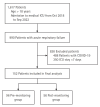Effect of nutrition support team on 28-day mortality in Korean patients with acute respiratory failure
- PMID: 40302562
- PMCID: PMC12151735
- DOI: 10.4266/acc.003312
Effect of nutrition support team on 28-day mortality in Korean patients with acute respiratory failure
Abstract
Background: Providing optimal nutrition to patients with acute respiratory failure is difficult because nutritional requirements vary according to disease severity and comorbidities. In 2021, the National Medical Center initiated a protocol for screening upon admission and regular monitoring by a multidisciplinary nutritional support team (NST), for all patients in the medical intensive care unit (ICU). This study aimed to evaluate the effects of routine NST monitoring and active intervention on the clinical outcomes of patients with acute respiratory failure.
Methods: Patients with acute respiratory failure requiring high-flow nasal cannula, non-invasive ventilation, or mechanical ventilation were included. The primary outcome was 28-day mortality after ICU admission. Secondary outcomes included the supplied/target calorie ratio, supplied/target protein ratio on day 7, and complications.
Results: In total, 152 patients were included in the analysis. The patients were divided into a pre-monitoring (n=96) and post-monitoring groups (n=56). More patients in the post-monitoring group received NST intervention and had earlier initiation of enteral feeding. In survival analysis, 28-day mortality was significantly lower in post-monitoring group (adjusted hazard ratio, 0.42; 95% CI, 0.24-0.74). The ratio of achievement for required calories and protein on day 7 was higher, but not significantly, in the post-monitoring group. No significant differences were observed in the incidence of complications.
Conclusions: Regular NST monitoring in the ICU could have contributed to a reduced risk of 28-day mortality in critically ill patients with acute respiratory failure.
Keywords: critical illness; intensive care unit; nutritional support; respiratory insufficiency.
Conflict of interest statement
No potential conflict of interest relevant to this article was reported
Figures
Similar articles
-
Feeding the critically ill obese patient: a systematic review protocol.JBI Database System Rev Implement Rep. 2015 Oct;13(10):95-109. doi: 10.11124/jbisrir-2015-2458. JBI Database System Rev Implement Rep. 2015. PMID: 26571286
-
Nutritional management and clinical outcome of critically ill patients with COVID-19: A retrospective study in a tertiary hospital.Clin Nutr. 2022 Dec;41(12):2940-2946. doi: 10.1016/j.clnu.2021.10.020. Epub 2021 Nov 1. Clin Nutr. 2022. PMID: 34782169 Free PMC article.
-
High-flow nasal cannula therapy versus continuous positive airway pressure for non-invasive respiratory support in paediatric critical care: the FIRST-ABC RCTs.Health Technol Assess. 2025 May;29(9):1-96. doi: 10.3310/PDBG1495. Health Technol Assess. 2025. PMID: 40326538 Free PMC article. Clinical Trial.
-
High-flow nasal cannulae for respiratory support in adult intensive care patients.Cochrane Database Syst Rev. 2021 Mar 4;3(3):CD010172. doi: 10.1002/14651858.CD010172.pub3. Cochrane Database Syst Rev. 2021. PMID: 33661521 Free PMC article.
-
Effect of a multidisciplinary nutrition management model in patients with critical illness: A randomized trial.Nurs Crit Care. 2024 Mar;29(2):417-426. doi: 10.1111/nicc.12988. Epub 2023 Nov 7. Nurs Crit Care. 2024. PMID: 37935453 Review.
References
LinkOut - more resources
Full Text Sources


